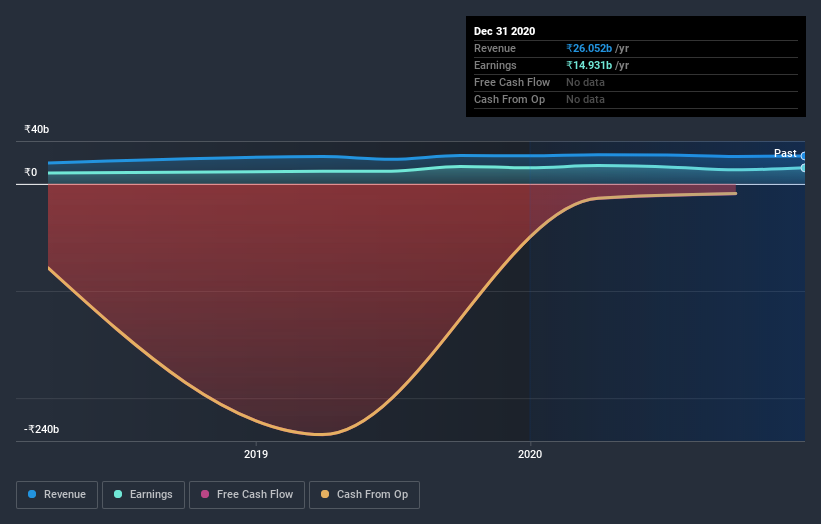- India
- /
- Diversified Financial
- /
- NSEI:HUDCO
Did You Participate In Any Of Housing and Urban Development's (NSE:HUDCO) Respectable 99% Return?

The simplest way to invest in stocks is to buy exchange traded funds. But one can do better than that by picking better than average stocks (as part of a diversified portfolio). For example, the Housing and Urban Development Corporation Limited (NSE:HUDCO) share price is up 79% in the last year, clearly besting the market return of around 41% (not including dividends). That's a solid performance by our standards! In contrast, the longer term returns are negative, since the share price is 28% lower than it was three years ago.
See our latest analysis for Housing and Urban Development
To paraphrase Benjamin Graham: Over the short term the market is a voting machine, but over the long term it's a weighing machine. One flawed but reasonable way to assess how sentiment around a company has changed is to compare the earnings per share (EPS) with the share price.
During the last year, Housing and Urban Development actually saw its earnings per share drop 0.8%.
We don't think that the decline in earnings per share is a good measure of the business over the last twelve months. It makes sense to check some of the other fundamental data for an explanation of the share price rise.
Absent any improvement, we don't think a thirst for dividends is pushing up the Housing and Urban Development's share price. And at a glance the languishing revenue does not impress, though a closer look might help explain the market optimism.
You can see how earnings and revenue have changed over time in the image below (click on the chart to see the exact values).

If you are thinking of buying or selling Housing and Urban Development stock, you should check out this FREE detailed report on its balance sheet.
What About Dividends?
It is important to consider the total shareholder return, as well as the share price return, for any given stock. Whereas the share price return only reflects the change in the share price, the TSR includes the value of dividends (assuming they were reinvested) and the benefit of any discounted capital raising or spin-off. So for companies that pay a generous dividend, the TSR is often a lot higher than the share price return. We note that for Housing and Urban Development the TSR over the last year was 99%, which is better than the share price return mentioned above. The dividends paid by the company have thusly boosted the total shareholder return.
A Different Perspective
Pleasingly, Housing and Urban Development's total shareholder return last year was 99%. That's including the dividend. This recent result is much better than the 6% drop suffered by shareholders each year (on average) over the last three. The optimist would say this is evidence that the stock has bottomed, and better days lie ahead. While it is well worth considering the different impacts that market conditions can have on the share price, there are other factors that are even more important. Take risks, for example - Housing and Urban Development has 3 warning signs (and 1 which shouldn't be ignored) we think you should know about.
Of course Housing and Urban Development may not be the best stock to buy. So you may wish to see this free collection of growth stocks.
Please note, the market returns quoted in this article reflect the market weighted average returns of stocks that currently trade on IN exchanges.
When trading Housing and Urban Development or any other investment, use the platform considered by many to be the Professional's Gateway to the Worlds Market, Interactive Brokers. You get the lowest-cost* trading on stocks, options, futures, forex, bonds and funds worldwide from a single integrated account. Promoted
Valuation is complex, but we're here to simplify it.
Discover if Housing and Urban Development might be undervalued or overvalued with our detailed analysis, featuring fair value estimates, potential risks, dividends, insider trades, and its financial condition.
Access Free AnalysisThis article by Simply Wall St is general in nature. It does not constitute a recommendation to buy or sell any stock, and does not take account of your objectives, or your financial situation. We aim to bring you long-term focused analysis driven by fundamental data. Note that our analysis may not factor in the latest price-sensitive company announcements or qualitative material. Simply Wall St has no position in any stocks mentioned.
*Interactive Brokers Rated Lowest Cost Broker by StockBrokers.com Annual Online Review 2020
Have feedback on this article? Concerned about the content? Get in touch with us directly. Alternatively, email editorial-team (at) simplywallst.com.
About NSEI:HUDCO
Housing and Urban Development
Provides loans and financing for housing and urban development projects in India.
Solid track record and fair value.
Similar Companies
Market Insights
Community Narratives




